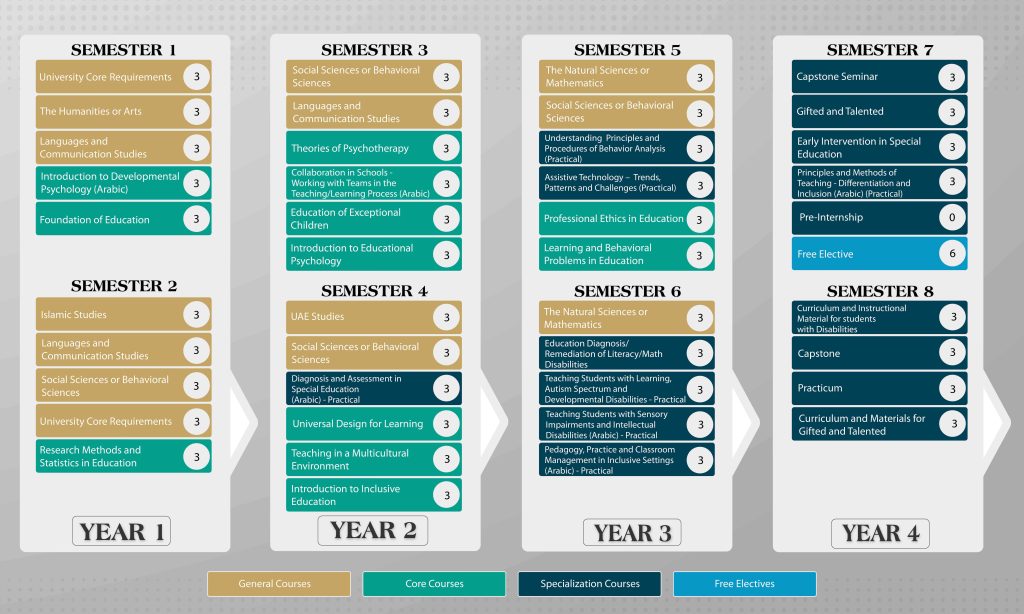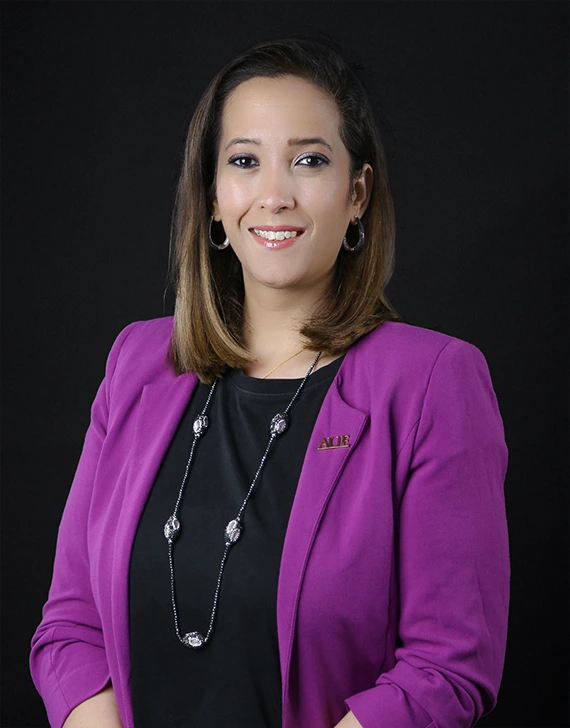This course aims to expose students to the historical, philosophical and sociological foundations of education. It further seeks to address questions related to the current societal and governmental policies affecting education and teaching profession today and in the future with focus on the United Arab Emirates context.
Developmental Psychology is the study of why and how humans change over the course of our lifespan, from conception to death. This course is designed to explore topics such as biological, cognitive, emotional, and social development, by conceptualizing the individual as a whole, with special attention to various cultural contexts of development and the rich diversity of the human experience across the lifespan. Specific topics will include: behavioral genetics, temperament, parent-child relations, sibling relations, peer relations, the self, intelligence, emotional development, and problems of social development (antisocial behavior, depression). In addition, several theoretical controversies will be discussed, including that of nature versus nurture. Students will have the opportunity to integrate their personal experiences, knowledge of psychology, and their observations of human development with the content of this course. In addition, students will investigate common research methodologies employed by developmental psychologists and have an opportunity to apply principles of developmental psychology in special educational settings.
This course provides an introduction of learning, motivational, and developmental theories with a focus on their application to the field of education across a variety of learning environments. Course content includes the concepts of behavior, cognitive and constructivist learning theories to teaching and managing an effective learning environment. Units of study also include the principles of motivation, classroom management, assessment of student performance, and learning and cognition influences on the learning process (behavioral & cognitive learning, humanistic aspects of learning, and perspectives on motivation). Additionally, the powerful role of the educator and curriculum decision-making are examined. Theory, research-based strategies, and inclusive pedagogy in an educational environment are emphasized.
This course aims to identify the social, emotional and psychological needs of pupils with special needs in inclusive classroom contexts. Students would be able to develop knowledge, skills and strategies to help pupils with all sorts of needs to learn better and feel comfortable in the classrooms along with their colleagues. Students may need to participate in seminar activities focused on collaborative means to develop skills required to help pupils with needs to learn better in the university or any other professional contexts
The course teaches skills to general educators and other school and social service providers and community members who are essential in providing inclusive/integrated environments for differently abled children and youth. Environmental modifications including classroom, school, agency, and community/business settings are studied. Classroom modifications in curriculum, assessment, behavior management, and instructional methods are examined. Methods of establishing supportive networks among families, schools, agencies, and private business are presented. The full range of desirable programs in fully inclusive, multicultural settings across the age span is discussed including preschool, transition, vocational, and community based programs. This course is designed for all educators and related providers who work with students with learning disabilities, attention deficits (with or without hyperactivity), developmental delays, behavior problems or other distinctive disorders. Participants will also gain understanding of students with dyslexia, autism and multiple disabilities.
This is an introductory course on the history, philosophy, and major approaches commonly used to systematically evaluate educational and social programs. The course is designed to provide students with curricular experiences and demonstrated knowledge in basic statistics, testing & assessment, and research and program evaluation. This course covers the essential concepts related to research design and methodology that practitioners need to become critical evaluators of research and prepare for conducting research in their practices. Students gain a more complete understanding of the research process. Included in this understanding are models of program evaluation and the use of research findings for program modification, while gaining an introductory understanding of measurement issues in research and assessment. Focus is on understanding each component of the research process, qualitative and quantitative designs, program evaluation, measurement issues, and data analysis. The course topics include the basic uses and purposes behind program evaluation, taxonomy of evaluation models (or approaches), descriptions of several important evaluation approaches, and guidelines for planning, conducting, and using evaluations. This course will provide an overview of basic concepts and issues involved in: (1) testing & assessment, (2) applied statistics, and (3) research within the perspective and context of the role of education and human service professionals.
This course aims to provide a general overview of the issues, principles and strategies associated with effective teaching practices in diverse learning environment (multi-culturalism). It explores how race, ethnicity, culture influence students experiences in school and learn multi-cultural strategies in teaching. This course will focus on theoretical and practical issues of diversity in classroom settings, especially related to culture, race, gender, ethnicity, language and socio-economic level. The classrooms settings represented by the demography present in UAE schools will provide the focus for these examinations.
The purpose of this course is to teach students the importance of collaboration between schools and families of special needs students. Collaborating with families is an important part of the job responsibilities of school professionals working with students with disabilities. This course introduces an in light of Parent and family rights through discussing the Individuals with Disabilities Education Act (IDEA) and understands that all school personnel must adhere to it. This course focuses on strategies for developing family-appropriate and culturally appropriate family professional partnerships to benefit children with special needs.
This course integrates principles of inclusive education and sustainability to prepare educators for creating inclusive and environmentally conscious learning environments for individuals with diverse abilities. Students will explore innovative teaching methods, adaptive resources, and technologies that promote sustainability and accessibility. The course emphasizes the application of Universal Design for Learning (UDL) principles to develop engaging and eco-friendly educational experiences.
This course is designed to provide you with a broad understanding of the major legal and ethical principles and issues that relate to teaching in Canadian schools, and to have you gain a familiarity with the important ethical and legal dimensions that are likely to affect an educator’s professional life.
The course aims at providing students with the foundations and principles of Universal Design for Learning (UDL). It includes one-hour practicum experience as a requirement that seek to enhance the service learning and outreach vision of the program. The school site practicum will provide opportunities for candidates to observe and evaluate instructional strategies based on class discussions and UDL standards. It focuses on teaching students of all abilities including those with special learning needs from preschool to postsecondary education, while implementing technology based and other UDL strategies. Students will apply UDL principles to the design of accessible instructional materials, then develop and implement UDL lesson plans.
The course aims to transfer of education assessment data into behavioral objectives, instructional planning for implementing such objectives, behavior management, techniques, methods, and materials for instruction, and formative and terminal evaluation techniques for individuals with learning and behavioral problems.




